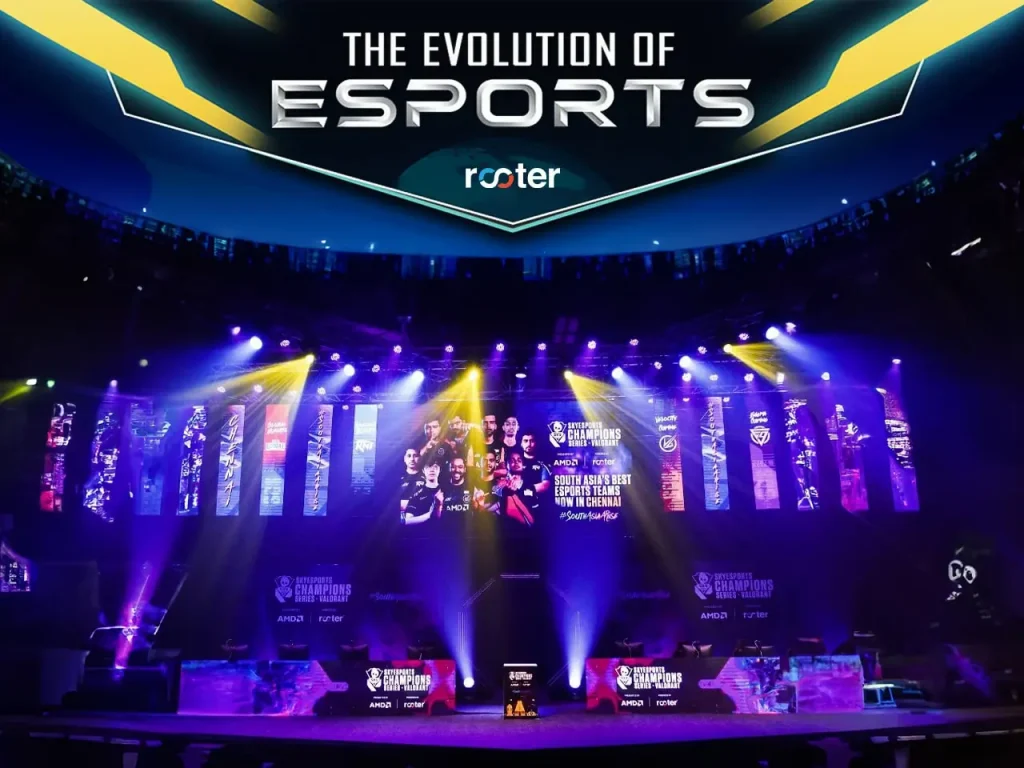The Evolution of Esports : From LAN Parties to Global Phenomenon 2023
3 min read
The Evolution of Esports
The Evolution of Esports story of competitive video gaming is a long one. ruled the humble arcade parlous and basements where the gaming community first emerged, long before the bright lights of contemporary esports arenas. Rivals arose, high scores were strongly debated, and a feeling of community was formed in these social hubs.
The Evolution of E-sports: Arcade Games and LAN Parties
Arcade games such as Pac-Man, Donkey Kong, and Space Invaders were social games during the 1970s and 1980s, when arcade gaming was at its peak.In order to play multiplayer games, players would gather up their PCs in one area, connect them, and play. More challenging and sophisticated games, like Quake and Starcraft, became popular among competitive players thanks to these LAN parties. These arcade classics created the foundation for the competitive gaming ecosystem, paving the way for the development of a complex and wide-ranging competitive gaming universe.
Esports’ Rising: Leagues, Streams, and Platforms
An important turning point for esports was the rise of streaming services like Twitch and YouTube Gaming, which provided a channel for general public recognition. These days, major events that capture the interest of the media and fans include leagues like the Overwatch League, the League of Legends World Championships, and the Dota 2 International. They’re becoming so popular and easily accessible that they’re even attracting audiences that rival those of traditional sports.
As online gaming grew in popularity in the early 2000s, professional esports players started to appear. Blizzard Entertainment’s real-time strategy game Starcraft: Brood War was among the first to have a dedicated competitive scene. Because of how well-liked the game was in South Korea, professional teams and televised competitions were established, drawing sizable crowds and big money.
Even though esports has gained popularity, other competitive gaming genres have also found niche markets. For example, online platforms have spawned a plethora of poker tournaments that accommodate a wide range of players and skill levels. These competitions, which have expanded the definition of competitive gaming, include the World Championship of Poker 2023, MicroMillions, Sunday Million, Saturday Line-Up, and Women’s Sunday, to name a few. Their hallmarks—strategic depth, international participation, and a sense of community among players—are similar to those of esports tournaments.
The extreme variety of competitive events, which range from real-time strategy games to first-person shooters, demonstrates the adaptability and size of the gaming industry. Whether it’s the intense strategy of the Hot or the superbly synchronized teamwork in Overwatch
The Future: Increasing Horizons and Technological Advancements
Esports appears to have a bright future ahead of it, with even more expansion and innovation anticipated. Esports events are starting to take place in stadiums; the 2018 Overwatch League Grand Finals were held at Brooklyn’s Barclays Centre. The increasing need for competitive gaming venues is also being met by the construction of esports arenas, like the Esports Stadium Arlington in Texas.
What can we expect from competitive video games? The ongoing development of augmented and virtual reality technology will bring new viewpoints to the field. A more diverse competitive gaming ecosystem appears to be in store for the future when combined with AI-driven analytics and new game mechanics. Since universities are now offering esports programmers , it has gained legitimacy as a possible career path.
Virtual reality presents a promising opportunity to transform esports by providing unparalleled possibilities of engagement and immersion. VR esports have already shown promise in games like Beat Sabre and Echo Arena, and more VR games and competitions are probably in store for us in the near future.
CONCLUSION
The evolution of esports began with social arcade games and LAN parties, leading to the rise of streaming services and the establishment of professional teams and televised competitions, with a promising future ahead due to technological advancements and increasing legitimacy as a career path.
READ MORE : “Asphalt 9 Legends” Guide-Tips, tricks and cheats to win more races








